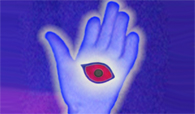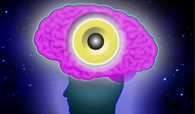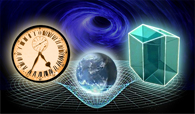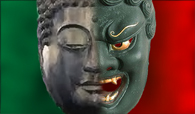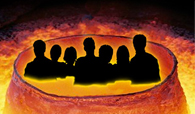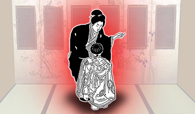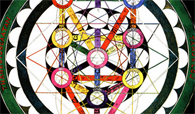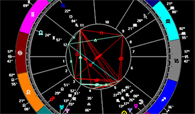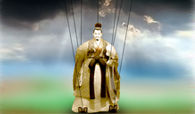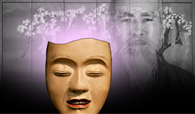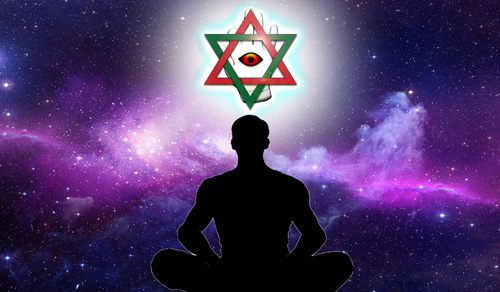
Meditation is the Beginning and End of Empowerment...
The reflections and perspectives contained within the foregoing pages illustrate many aspects of the human condition, and they provide essential new and extended perspectives and understandings on the hidden forces that may be acting in our lives; such additional information without a doubt helps us to make sense of the often contrary nature of existence! However, even if we have armed ourselves with every possible rationale and conscious appreciation of other-dimensional influences, fundamentally such reasoned understandings are still mental models, which are, of necessity, entertained by the conscious mind. Any and all knowledge is good, but knowledge is not wisdom, and in order to move to the next level of enlightenment, such understandings ultimately need to be surrendered in order for the next level of empowerment to begin - that which springs from the non-conscious and timelessly-wise intuitive self.
Meditation is the gateway to this higher level of wisdom, empowerment, and healing, and, once begun, it remains an essential technique to be used throughout life for maintaining peace, strength, balance, and an expanding intuitive understanding of life and its inner meaning and influences.
One might ask: if true empowerment begins with meditation, why bother with the foregoing pages? Well, the framework of the forces acting in a human life that is provided gives us concrete concepts that the mind can work with, and understanding that there is more going on in the background – out of our conscious control - can be very reassuring when life becomes particularly contrary! However, the mere act of entertaining such concepts on a conscious level gives rise to an important subliminal effect – the concepts described open the door to symbolism, which is a powerful mechanism for linking the conscious self with the intuitive self. The foregoing pages illustrate that life is not straightforward and amenable to willing it to be a certain way, and is instead at the mercy of less obvious yet powerful influences, and is also inextricably inter-connected with the lives of others, and taking on board these concepts initiates humility, and this really opens the door to the intuition; as long as we believe that the boisterous conscious mind is the be-all and end-all of navigating our way through life, we will never be open to the wisdom that our intuition is desperate to share with our consciousnesses, in order to help us to live more enlightened and better lives. The ideal starting point for someone considering meditation is an understanding that “...no-one is an island, and I can only control so much, but I can broaden my understanding of what is going on and what I need to learn, and I accept that at times I must switch off my conscious mind in order to connect myself to and absorb deeper wisdom, which will take my life to higher levels.”
Having arrived at this understanding, for many, the difficulty is in knowing how to begin meditating, and this is why Kendo Nagasaki has created his Empowerment Meditation. It is a so-called "guided" meditation, which means that you need neither special knowledge nor experience to begin using it - all you need to do is listen, and allow the fruits of Kendo's wisdom to guide you through the process. It is entirely safe – it is not hypnosis, and it will not have any effect other than stilling the conscious mind for a short span of time, during which your intuitive self will become available to you. However, this simple, holistic process is fundamentally empowering – your intuition knows all about what’s going on in your life, including its meaning and purpose, and the imparting of this wordless understanding alone is deeply calming and illuminating. Such understanding is completely beyond the chatter-box mind, which is why it needs to be gently and reassuringly encouraged to rest for a while, as deeper wisdom absorbed. Personal empowerment, healing, and a higher and broader vision of one’s life path naturally flow from intuitive enlightenment, which is timeless and rooted in the deeps of the universe.
As you listen to Kendo’s Empowerment Meditation, an atmosphere is established through the music and the sounds of water and birdsong, and the commentary sets the scene; eventually, you find yourself seated before Kendo as he plays specially-tuned singing bowls, which progressively relax your conscious mind. You are not being encouraged to enter any kind of sleep-state – you retain your consciousness, aware of each struck singing bowl, yet feeling its effect as it gradually stills your consciousness to the theta state – the same as that experienced by a deeply-meditating Buddhist monk: conscious, yet completely still. When you hear the deep temple bell, it is in this state of wakefulness yet complete stillness that you wordlessly commune with your timeless intuitive self, gaining wisdom on ancient and deep levels, absorbing, understanding, envisaging, and experiencing the infinite power and depth of the universe, and your place within it. This is enlightenment and empowerment which you can bring from the depths of the universe, through your intuitive self, and into your daily life, and so revolutionise your life. The singing bowls then gradually raise your conscious alertness out of meditation and back to full awareness, and Kendo’s Anthem inspires and motivates you to live your life empowered, inspired, strong, and well, an excellent life, continually being elevated to higher levels and an inspiration to others.
The effect of Kendo's Empowerment Meditation is subtle yet powerful; as the mind is being stilled, it will not be aware of any miraculous changes, but having meditated, you will find that you are calmer, stronger, more capable, more inspired, more centred, better able to focus, and healthier, and you will feel a reassuring connection to the ancient and mystical forces of nature, such as those of the Tree of Souls. You should listen to Kendo's Empowerment Meditation whenever you feel is appropriate - your intuition will guide you on this; you may want to meditate once a day or more, or you may prefer to meditate every few days - there really is no right or wrong way - but however often you choose, Kendo's Empowerment Meditation will bring about positive changes in your life. Through experiencing the peace at the heart of the spiritual warrior, you can become the highest manifestation of an enlightened and empowered soul, in touch with your intuitive self and the wisdom of the universe.
As mentioned in the Booklet accompanying his Empowerment Meditation, here is Kendo’s Commentary on Consciousness.
”Most creatures are conscious or can be said to have “consciousness” when they are awake and responsive to their environment. Consciousness itself can be argued to have evolved as a survival mechanism; its job is to take-in sensory stimuli and make sense of them, such as recognising a threat and deciding how to avoid it, or recognising safe conditions in which to sleep or to nest. For millennia, the foregoing was as true for early humans as it was for any other animal, but, following an evolutionary “accident” which led to massive development of our brains, human consciousness subsequently benefited from highly-advanced information processing, which included the development of language. Thus, we became able to communicate complex ideas to each other and discuss and develop them, but also to rationalise internally, with “inner speech”, puzzling things out for ourselves.
In evolutionary terms, the development of human intelligence eliminated the need to wait for mutations before we could adapt to the environment – we became able to think our way to success as a species. However, the kind of information processing facilitated by this new layer in the brain does not supersede or replace the qualities and responsibilities of the four other, older layers of the brain, which are by no means simplistic: many aspects of self-concept can be shown to spring from the brain stem, the oldest and perhaps simplest of them all, which has never needed a conscious mind to function perfectly well for millennia. The thinking, conscious mind is a relative newcomer, a bolt-on function which inhabits a bolted-on bit of the brain, and it’s in unfamiliar territory – the rest of the brain has been successfully fully-integrated for a very long time (across many species), it encompasses all of the deeper aspects of the self, and it needs no language.
As intelligent information processing is what the mind evolved to do, it could be described as being very much like a calculator – it’s excellent at providing answers to the kind of problems it’s right for. However, as survival became less of an acute daily challenge, the mind began to muse upon things other than survival, such as itself, and other “deep and meaningful” concepts. This is where things began to go wrong – just as a calculator is specialised for arriving at answers in maths, it’s useless for art, or music, and this analogy holds true for the “self”: the conscious mind is essential for tasks such as functioning in a social group or talking or planning, but it contributes nothing regarding emotional well-being or intuitive matters, such as self-concept or understanding one’s place in the universe.
The conscious mind doesn’t understand the long-established, older parts of the brain, and it is fickle, entirely capable of becoming distracted by nonsense and pointlessly absorbed in its own mercurial chatter. Furthermore, in being the device which measures all it surveys, it fails to measure itself, so it is only brought into line by an enlightened consciousness subjecting it to discipline and control, and knowing when to switch it off.
The mind readily demonstrates that it is not self-regulating – it will rationalise anything it encounters, even if this process goes well beyond the scope of its knowledge; the resultant outcomes are often unsatisfying and confusing, and lead only to doubt and insecurity.
Philosophy emerged as a discipline which forges mental processes into usable analytical tools – it represents the intelligent application of the reasoning mind to questions of existence, and some remarkable and intriguing perspectives have emerged. Ironically, though, it is one of the more daring “thought experiments” which illustrates that there’s more to life than the mind: if you do dare to “Think yourself out of existence, and then think yourself back in”, you’ll be oddly reassured by the experience of mindlessness, because you’ll find that there’s still so much there! However, wrestling with one’s own mind in such ways can be pretty stressful and rewarding outcomes are by no means guaranteed; better results can be achieved by persuading the mind that it’s a good idea to relax and defer to other sources of wisdom.
The difficulty is in knowing how to switch off this runaway chatterbox, and, if we do, what should take its place? There can be an odd sense of security in the familiar frantic background noise of the mind, and being asked to step away from it can seem frightening: “These questions/problems define me! What am I without them?” There is no need to worry – meditating means simply setting conscious concerns aside for a while; they can be picked-up again afterwards if desired, albeit with a refreshing, new perspective upon them...
Turning to appropriate use of the mind, Western culture encourages us to rely excessively upon the conscious mind, at the expense of other resources; it should be remembered that in ancient Eastern models of the “self”, the mind is but one of seven levels – one of the seven chakras. Whilst it may be true that the Westernised mind is the perfect tool for dealing with Westernised life, we are fundamentally so much more than the shallow culture which immerses us, and functioning within which consciousness becomes specialised; regardless of how attractively it’s all presented, no amount of consumerism or social media will bring real strength, peace, or meaning to our lives – quite the reverse, in fact.
The limitations of the conscious mind can be seen in such subjective and emotive questions as those surrounding the purpose for our existence, or why human life can be so illogically cruel. Even if we have grown up in an environment where faith is put in the answers given by religious doctrine, the mind still questions, perhaps hoping for such versions of reality to be supported by consistency with science and applicability to other problems; but the conscious fruits of our technological, sub-atomic age continue to ask further questions of religion which it cannot answer, and so faith is progressively eroded, leaving just the conscious questions – which give rise to yet more questions. This situation is most uncomfortable, as it gives rise to insecurity – another problem which the mind is capable of amplifying, but not resolving.
Prayer is often a very good thing, because it requires a mental withdrawal from the world to focus upon the ideals of a deity; the religious person has accepted that the conscious mind cannot answer all needs, and such an act of humility puts the mind in its place to some extent – something it would not do itself, and which is healthy.
However, through the use of symbolism, the conscious mind can act as a gateway to the things we need to experience in ways other than mentally. It should be remembered that conscious thought is not the same as experiencing something – our five senses communicate with the deeper levels of the brain, and always have done; the mind will usually have an opinion on what is sensed, but just because it presents shallows in which to paddle, we can still choose to swim in the depths. The foregoing is an example of symbolism, which links meaning with images (actual and mental), and simply seeing something can give rise to a powerful intuitive response within us. Whilst your conscious mind is making sense of it, this very text is opening doors on deeper inner levels of yourself, doors which lead to intuitive ideas and inklings which are infinitely older and more substantial than conscious chatter, including the possibility that your own foundations are deeper and stronger than your consciousness could ever imagine.”
The Kendo Nagasaki Empowerment Meditation capitalises upon this and other sources of knowledge to bring you a simple yet effective method for finding an empowered balance between all levels of your self; we hope you find the experience enjoyable and invigorating!
Next...

